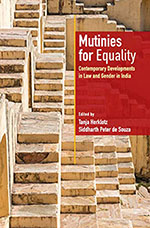Mutinies for Equality: Contemporary Developments in Law and Gender in India edited by Tanja Herklotz and Siddharth Peter de Souza is an attempt to examine gender inequality in India on the basis of doctrinal and empirical research in multiple sites. Titling the volume ‘Mutinies for Equality’, the editors argue, is a ‘recognition of the many battles that have been and continue to be fought to bring out greater gender equality in India and their implications for wider systemic transformations’ (p. 3). They examine ‘mutinies’ under three ‘rubrics’— (a) ‘Systems of Inequality’, (b) ‘Battles for Equality’ and (c) ‘Realising Equality’ (p. 3).
The first section on ‘Systems of Inequality’ consists of five chapters. Krithika Ashok, in her chapter titled ‘Family Matters, Gender Matters: Courts on the Rule against Restraints on Alienation’ looks at property ownership and its gendered inflections through the prism of market transactions through a reading of case law, stepping away from the common preoccupation with family laws as the site of analysis. Arguing that the women in these transactions are often treated as ‘passive (often undeserving) recipients of the benevolence of the family patriarch’, she suggests that this perception is tied to the undervaluation of women’s labour within the family-household. What needs revisiting, however, is Ashok’s observation—in looking at cases from 1882 to the present—that she does not consider any analytical break between case law in colonial and Independent India. While courts may cite precedents seamlessly in various realms of colonial law in operation in Independent India, the adoption of the Constitution in 1950 provides an opportunity for an insurgent analysis that ruptures this seamless reading in scholarship on these laws—precisely because the principle of substantive and enduring equality provides a heuristic separation, whether or not courts understand that.

